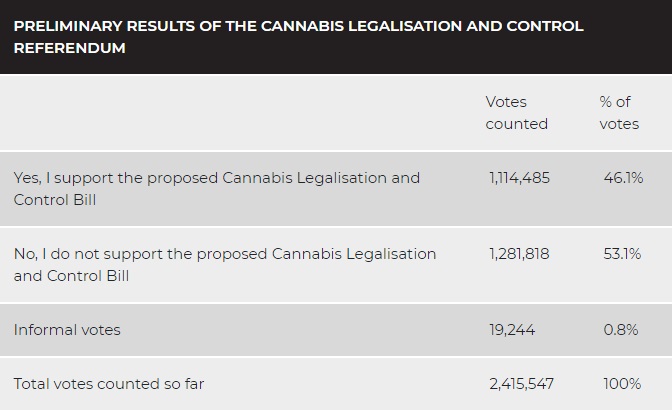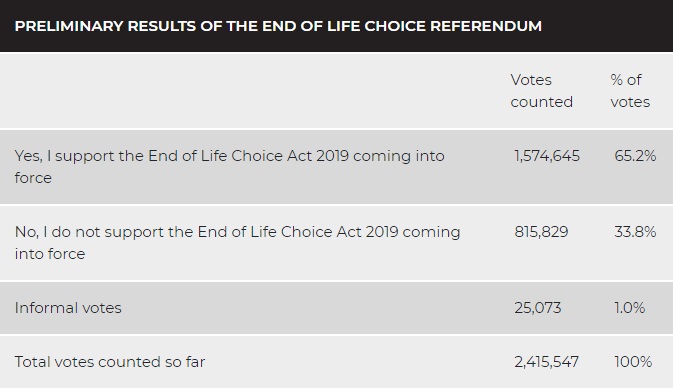
- The preliminary results for the cannabis and euthanasia results were released at 2pm today.
- Majority in favour of passing End of Life Choice Act 2019
- Slim majority for not legalising cannabis
- Final results are released next Friday, November 6.
- The final results will include about 480,000 special votes, so if preliminary results are close, we may not know the full outcome until next Friday.
- If it's a "yes" vote for cannabis, it will take about 18 months for laws to change.
- If it's a "yes" for euthanasia, it will be about a year before terminal patients can request assisted dying.
New Zealanders have voted yes on euthanasia, no on cannabis legalisation, preliminary numbers show.
With an estimated 17 per cent of votes still to be counted, 65.2 per cent voted in support of the End of Life Choice Act, while 53.1 per cent voted against the Cannabis Legalisation and Control Bill.

The Electoral Commission released the results at 2pm, but any close margin may mean another week of nervous waiting before the final results are unveiled on November 6.
The final tally will include 480,000-odd special votes, which at 17% of the total count could be a decisive swing.
The euthanasia result, if recent polls are anything to go by, is expected to get across the line, meaning the End of Life Choice bill would become law.
The cannabis result is expected to be closer, with most recent polls showing the 'no' vote ahead, though some poll results bucked that trend in the weeks before polling day.
Special votes also tend to be more left-leaning, meaning a narrow lead for the "no" vote could be flipped on special votes.

The Electoral Commission said the two-week wait for the preliminary referendum results was down to prioritising the votes for the general election, for which preliminary results were released within hours of polling booths closing.
"We're guided by the Referendums Framework Act which made it clear that the priority was to get the official count of election results under way first, so that the referendum count did not delay the final general election results," a commission spokeswoman said.
"We have a dedicated team of about 1200 people counting the referendum votes at electorate headquarters. On election day, there were more than 20,000 people working in voting places and counting votes to help produce the preliminary election results."
Earlier today

"It is a pretty big deal. We haven't even begun to lift the lid on what this might mean in terms of the ability to help people."
But she was also worried that a "no" vote would consign the issue to the backburner for at least few more years.
"Look at the cautiousness of politicians. There's a reason I was effectively left out on my own as a Green MP to advocate for this."
Today Act leader David Seymour is hosting a function in Parliament that he is quietly confident will be a celebration of his End of Life Choice Act.

An exit poll conducted by Curia showed 61% voted in favour of the bill, while 29% voted against it and 10% refused to say.
"Theoretically it could be a bad poll, but it would have to be pretty wrong," Seymour told the Herald.
"I think that's a massive step forward for New Zealand as a humane and civilised society."
A large margin in today's result would effectively mark the end of the five-year journey for Seymour since he first put the bill into the ballot.
"A lot of people want to make a difference in their job, and a lot of MPs work very hard and - through no fault of their own - don't get the opportunity to make a major change in the law.
"So I feel very lucky in that sense. In practical terms it means that thousands in the next few years who might have had excruciating deaths will have control and dignity and choice."
Among those expected to be at Seymour's function are Shirley Seales and, via Skype from New York, Matt Vickers - the mother and widowed husband of euthanasia campaigner Lecretia Seales.
The referendum is binding and a majority "yes" vote would see it become law, with terminal patients able to request assisted dying from November 6 next year.
The cannabis referendum is not binding, but Labour has pledged to push the Cannabis Legalisation and Control Bill into law in the event of a "yes" vote.
A spokesman for the Drug Foundation said they were "slightly optimistic" given how special votes tended to be left-leaning.
A higher turnout this election (82.5% turnout compared with 79.8% in 2017) and Swarbrick's preliminary win in Auckland Central are also signs that more younger people voted this time, and they tend to be "yes" voters.
Swarbrick, one of the loudest voices in the "yes" campaign, will be at Albert Park fountain in Auckland at 3pm to address media.
An hour later, the Say Nope to Dope campaign will hold a press conference at the Urban Soul cafe in Manukau.
Campaign spokesman Aaron Ironside said a close result would not be surprising.
"We are aware that special votes may well be a swing to the 'yes' rather than the 'no'. We have a number in mind where we will feel confident that the swing votes are unlikely to undo that."
He wouldn't share the number, but said it was in the vicinity of the last 1 News Colmar Brunton poll, which had 51% "no" and 41% "yes".
The campaign would remain active if there was a majority "yes" vote, he said.
"We haven't worked out the 'how' but our intention is to participate in the [parliamentary] process to try and address the issues of most concern to us."
Those include minimising youth use, THC potency and proximity of licensed premises to vulnerable communities.
"We are of course still hopeful that it won't come to that. We are certainly aware that if [today's] result is very close, it would be unwise for either side to claim victory."















